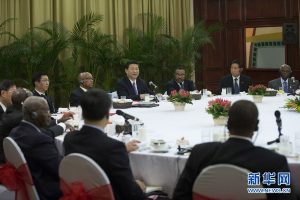The most important in this week’s headlines out of and concerning Africa, for those who need help catching up.
In this week’s news, China continues its soft power campaign in Africa, a war of words between two East African nations, and the World Health Organization (WHO) makes a prediction about the future of AIDS.
- China continues a soft power campaign in Africa
Washington, DC-based Brookings Institution brings us a story about the intrigues of China’s soft power politics in Africa after more than 100 African as well as Chinese Think Tanks met in Pretoria, South Africa for the Fourth China-Africa Think Tank Forum.
According to Brookings fellow, Yun Sun, the discussion which focused heavily on the future of Sino-Africa relations “is a good example of China’s heightened efforts to strengthen its soft power in Africa and to seek influence at an intellectual level on top of its already expanding economic and political footprint.”
Sun goes on to list the many avenues the Chinese have used to boost their presence in the continent, such as with the famous Beijing Consensus, the creation of 42 Confucius Institutes in 29 African countries and the provision of thousands of fellowship opportunities for African youth.
2. A tense back and forth between Rwanda and Burundi
From the British Broadcasting Corporation (BBC) comes this story about Rwanda and Burundu, who are engaged in a war of words about the destabilizing effects of rebel activities within the confines of their respective borders.
Rwanda, said to be hosting the leader of a failed coup in Burundi, is being accused by the Burundi government for training rebels who are seeking to destabilize their country. Rwanda on the other hand denies the accusation, saying that Burundi wants to deflect attention from its own internal problems.
Burundi is facing civil unrest after protests and assassinations following a bid for a third-term in office by current president Pierre Nkurunziza. The decision to seek a third-term inspired the failed coup in the country.
“The two governments have a tense relationship, with both countries sharing a similar ethnic make-up,” the BBC report says. “Both Rwanda and Burundi have long experienced ethnic conflict between a Hutu majority and a Tutsi minority which has traditionally been dominant.”
Meanwhile another report states that the European Union(EU) has imposed a travel ban and freeze on the assets of aides associated with Nkurunziza, as well as the leaders of the failed coup.
3. WHO working to eliminate HIV by 2030
From Vox comes this story about plans by the World Health Organization (WHO) to end the AIDS epidemic by 2030. That would be in just another 15 years.
How they plan to do this is what makes the Vox story an interesting read.
Based on new WHO guidelines, there are no more restrictions on who gets treatment after they are infected. Also, those considered vulnerable, or at “substantial” risk of HIV will be offered preventive treatment based on the guidelines, the Vox reports states.
“The radical expansion on prevention and treatment therapies for HIV is part of a push to end the AIDS epidemic over the next 15 years.”
According to AIDS.gov, a U.S. government website managed by the Department of Health and Human Services, 35 million people worldwide are living with HIV/AIDS. The website states that the vast majority of people with the disease are in low-and middle-income countries, particularly in sub-Saharan Africa.

